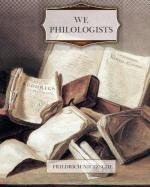140
The incarnate appearance of gods, as in Sappho’s invocation to Aphrodite, must not be taken as poetic licence . they are frequently hallucinations. We conceive of a great many things, including the will to die, too superficially as rhetorical.
141
The “martyr” is Hellenic: Prometheus, Hercules. The hero-myth became pan-Hellenic: a poet must have had a hand in that!
142
How realistic the Greeks were even in the domain of pure inventions! They poetised reality, not yearning to lift themselves out of it. The raising of the present into the colossal and eternal, e.g., by Pindar.
143
What condition do the Greeks premise as the model of their life in Hades? Anaemic, dreamlike, weak . it is the continuous accentuation of old age, when the memory gradually becomes weaker and weaker, and the body still more so. The senility of senility . this would be our state of life in the eyes of the Hellenes.
144
The naive character of the Greeks observed by the Egyptians.
145
The truly scientific people, the literary people, were the Egyptians and not the Greeks. That which has the appearance of science among the Greeks, originated among the Egyptians and later on returned to them to mingle again with the old current. Alexandrian culture is an amalgamation of Hellenic and Egyptian . and when our world again founds its culture upon the Alexandrian culture, then....[12]
146
The Egyptians are far more of a literary people than the Greeks. I maintain this against Wolf. The first grain in Eleusis, the first vine in Thebes, the first olive-tree and fig-tree. The Egyptians had lost a great part of their mythology.
147
The unmathematical undulation of the column in Paestum is analogous to the modification of the tempo: animation in place of a mechanical movement.
148
The desire to find something certain and fixed in aesthetic led to the worship of Aristotle: I think, however, that we may gradually come to see from his works that he understood nothing about art, and that it is merely the intellectual conversations of the Athenians, echoing in his pages, which we admire.
149
In Socrates we have as it were lying open before us a specimen of the consciousness out of which, later on, the instincts of the theoretic man originated: that one would rather die than grow old and weak in mind.
150
At the twilight of antiquity there were still wholly unchristian figures, which were more beautiful, harmonious, and pure than those of any Christians: e.g., Proclus. His mysticism and syncretism were things that precisely Christianity cannot reproach him with. In any case, it would be my desire to live together with such people. In comparison with them Christianity looks like some crude brutalisation, organised for the benefit of the mob and the criminal classes.




